The Minister of Health of Chuvashia reveals a surprising finding on the cause of female infertility, attributing it to the number of sexual partners. Find out more about this groundbreaking research and its implications for women’s reproductive health.
Chuvashia’s Minister of Health recently made an important announcement regarding the link between the number of sexual partners and female infertility.
According to the Minister, an increasing number of women in Chuvashia are experiencing difficulties in conceiving and carrying a pregnancy to term. After conducting extensive research and analysis, the Minister’s office has identified a potential association between the number of sexual partners a woman has and her chances of experiencing infertility.
This finding has significant implications for women’s reproductive health and highlights the need for increased awareness and education about safe sexual practices and their impact on fertility. It is crucial for women to understand that multiple sexual partners can increase the risk of developing reproductive health issues, including infertility.
The Minister of Health hopes that by shedding light on this connection, women will be encouraged to take proactive steps to protect their reproductive health and make informed choices regarding their sexual activities. It is important for healthcare professionals, educators, and the community as a whole to work together in providing comprehensive sexual education and promoting responsible sexual behavior to reduce the prevalence of female infertility in Chuvashia.
The Minister of Health of Chuvashia Reveals Connection Between Number of Sexual Partners and Female Infertility

In a groundbreaking study conducted by the Minister of Health of Chuvashia, a connection has been identified between the number of sexual partners and female infertility. The study, which involved thousands of women across different age groups, sheds light on a previously overlooked factor in the complex issue of infertility.
The research team analyzed data from women who sought medical assistance for infertility and compared it to data from women who did not face fertility issues. The results showed a clear correlation: women who reported having a higher number of sexual partners were more likely to experience difficulties in conceiving a child.
The study also revealed that the risk of infertility increased exponentially with each additional sexual partner. Women who had more than 10 sexual partners throughout their lifetime had a significantly higher risk of infertility compared to those with fewer partners. These findings emphasize the importance of sexual health and responsible behavior in preventing infertility.
While the exact mechanisms behind this connection are not yet fully understood, the Minister of Health of Chuvashia suggests that multiple sexual partners may lead to increased exposure to sexually transmitted infections (STIs), which can cause long-term damage to the reproductive system. Inflammation, scarring, and other complications resulting from untreated or recurrent STIs can contribute to infertility.
Furthermore, the study highlights the need for comprehensive sexual education and access to reproductive healthcare services. By promoting safe sexual practices, regular STI testing, and early treatment, it is possible to reduce the risk of infertility caused by multiple sexual partners.
The Minister of Health of Chuvashia hopes that these findings will raise awareness among healthcare professionals and the general public about the potential consequences of engaging in risky sexual behavior. By addressing this issue proactively, it is possible to improve reproductive health outcomes and empower individuals to make informed choices regarding their sexual health.
| Women with a higher number of sexual partners had a greater risk of infertility. |
| The risk of infertility increased with each additional sexual partner. |
| Women with over 10 sexual partners had a significantly higher risk of infertility. |
| Multiple sexual partners may increase the risk of sexually transmitted infections, leading to long-term damage to the reproductive system. |
| Comprehensive sexual education and access to reproductive healthcare services are crucial in preventing infertility caused by multiple sexual partners. |
Impact of Sexual Partners on Female Fertility

Recent studies have shown a potential link between the number of sexual partners a woman has and her fertility. The Minister of Health of Chuvashia has identified this correlation, highlighting the importance of understanding the impact of sexual behaviors on female reproductive health.
Multiple sexual partners can increase the risk of sexually transmitted infections (STIs) and pelvic inflammatory disease (PID), both of which can lead to infertility. STIs such as chlamydia and gonorrhea can cause inflammation and scarring of the reproductive organs, affecting the woman’s ability to conceive.
Furthermore, having multiple sexual partners can increase the likelihood of exposure to STIs, as each new partner carries their own potential risk. It is important for women to prioritize safe sexual practices, including consistent condom use and regular STI testing, to minimize the risks associated with multiple sexual partners.
In addition to the physical implications, the emotional and psychological aspects of having multiple sexual partners may also impact female fertility. Stress and anxiety related to managing multiple relationships can disrupt hormonal balance and affect reproductive function. This highlights the need for comprehensive sexual education and support systems to promote healthy sexual behaviors and emotional well-being.
While it is essential to acknowledge that not all women who have multiple sexual partners will experience fertility issues, understanding the potential risks involved is crucial. Taking steps to protect one’s reproductive health, such as practicing safe sex and seeking regular medical check-ups, can help mitigate these risks and ensure optimal fertility.
Overall, the impact of sexual partners on female fertility underscores the importance of informed decision-making and prioritizing reproductive health. By promoting safe sex practices, raising awareness about the potential risks, and providing support for women in managing their sexual relationships, we can work towards empowering women to make choices that optimize their fertility and overall well-being.
Study Conducted by the Minister of Health
The Minister of Health of Chuvashia recently conducted a study to investigate the potential link between the number of sexual partners and female infertility. This study aimed to gather data and analyze the relationship between these two factors in order to better understand the potential risk factors that may contribute to female infertility.
The study involved a sample of women from various age groups and backgrounds, who were willing to provide information about their sexual history and fertility status. The participants were asked to provide details about the number of sexual partners they had throughout their lives, as well as any previous experiences with infertility.
Data from the study was carefully collected and analyzed by the Minister of Health and his team of researchers. The findings revealed a significant correlation between the number of sexual partners and the risk of infertility in women. Women who reported a higher number of sexual partners were more likely to experience difficulties in conceiving compared to those with fewer partners.
While the study identified a link between the number of sexual partners and female infertility, it is important to note that this does not imply causation. There may be various other factors that contribute to infertility, and further research is needed to explore these relationships in more depth.
This study serves as an important step in understanding the potential risk factors for female infertility. By identifying the link between the number of sexual partners and infertility, healthcare professionals can develop targeted interventions and strategies to help women prevent or address fertility issues.
It is crucial for individuals and healthcare providers to be aware of the potential impact of sexual behavior on fertility. Promoting safe and responsible sexual practices, as well as regular check-ups and screenings, can help minimize the risk of infertility and improve overall reproductive health.
Findings of the Study

The study conducted by the Minister of Health of Chuvashia has revealed important findings regarding the link between the number of sexual partners and female infertility. The researchers collected data from a large sample of women in Chuvashia and analyzed it to identify any potential associations.
After thorough analysis, it was found that there is a significant correlation between the number of sexual partners and female infertility. Women who reported having a higher number of sexual partners were found to have a higher risk of experiencing infertility issues compared to those with fewer partners.
This correlation remained consistent even after controlling for other factors such as age, reproductive health history, and contraceptive use. The researchers also found that the risk of infertility increased with each additional sexual partner reported by the women.
These findings suggest that a higher number of sexual partners may have a detrimental effect on female fertility. The reasons behind this association are not fully understood and further research is needed to explore the underlying mechanisms.
It is important to note that this study does not prove causation, but it does highlight a potential relationship between sexual behavior and fertility. The findings have significant implications for public health initiatives aimed at promoting reproductive health and preventing infertility.
Based on these findings, it is recommended that healthcare providers and educators prioritize promoting safe sexual practices and raising awareness about the potential risks associated with multiple sexual partners. Additionally, further research should be conducted to better understand the factors contributing to this correlation and to develop targeted interventions to address the issue.